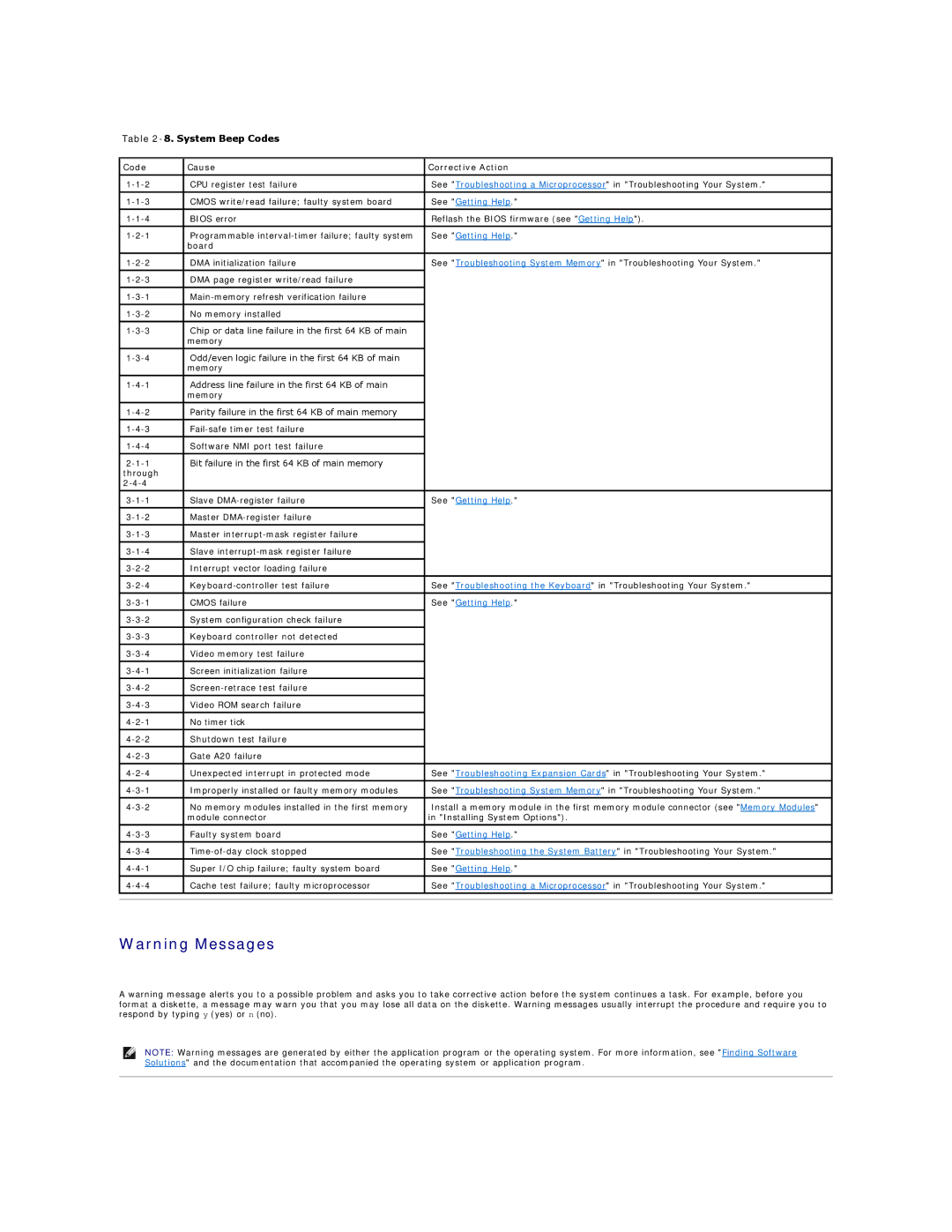Table 2-8. System Beep Codes
Code | Cause | Corrective Action |
CPU register test failure | See "Troubleshooting a Microprocessor" in "Troubleshooting Your System." | |
|
|
|
CMOS write/read failure; faulty system board | See "Getting Help." | |
|
|
|
BIOS error | Reflash the BIOS firmware (see "Getting Help"). | |
|
|
|
Programmable | See "Getting Help." | |
| board |
|
DMA initialization failure | See "Troubleshooting System Memory" in "Troubleshooting Your System." | |
|
|
|
DMA page register write/read failure |
| |
|
|
|
| ||
|
|
|
No memory installed |
| |
|
|
|
Chip or data line failure in the first 64 KB of main |
| |
| memory |
|
|
|
|
Odd/even logic failure in the first 64 KB of main |
| |
| memory |
|
Address line failure in the first 64 KB of main |
| |
| memory |
|
Parity failure in the first 64 KB of main memory |
| |
|
|
|
| ||
|
|
|
Software NMI port test failure |
| |
|
|
|
Bit failure in the first 64 KB of main memory |
| |
through |
|
|
|
| |
|
|
|
Slave | See "Getting Help." | |
|
|
|
Master |
| |
|
|
|
Master |
| |
|
|
|
Slave |
| |
Interrupt vector loading failure |
| |
|
|
|
See "Troubleshooting the Keyboard" in "Troubleshooting Your System." | ||
|
|
|
CMOS failure | See "Getting Help." | |
|
|
|
System configuration check failure |
| |
|
|
|
Keyboard controller not detected |
| |
|
|
|
Video memory test failure |
| |
|
|
|
Screen initialization failure |
| |
|
|
|
| ||
Video ROM search failure |
| |
|
|
|
No timer tick |
| |
|
|
|
Shutdown test failure |
| |
|
|
|
Gate A20 failure |
| |
|
|
|
Unexpected interrupt in protected mode | See "Troubleshooting Expansion Cards" in "Troubleshooting Your System." | |
|
|
|
Improperly installed or faulty memory modules | See "Troubleshooting System Memory" in "Troubleshooting Your System." | |
|
|
|
No memory modules installed in the first memory | Install a memory module in the first memory module connector (see "Memory Modules" | |
| module connector | in "Installing System Options"). |
Faulty system board | See "Getting Help." | |
|
|
|
See "Troubleshooting the System Battery" in "Troubleshooting Your System." | ||
|
|
|
Super I/O chip failure; faulty system board | See "Getting Help." | |
|
|
|
Cache test failure; faulty microprocessor | See "Troubleshooting a Microprocessor" in "Troubleshooting Your System." | |
|
|
|
|
|
|
Warning Messages
A warning message alerts you to a possible problem and asks you to take corrective action before the system continues a task. For example, before you format a diskette, a message may warn you that you may lose all data on the diskette. Warning messages usually interrupt the procedure and require you to respond by typing y (yes) or n (no).
NOTE: Warning messages are generated by either the application program or the operating system. For more information, see "Finding Software Solutions" and the documentation that accompanied the operating system or application program.
